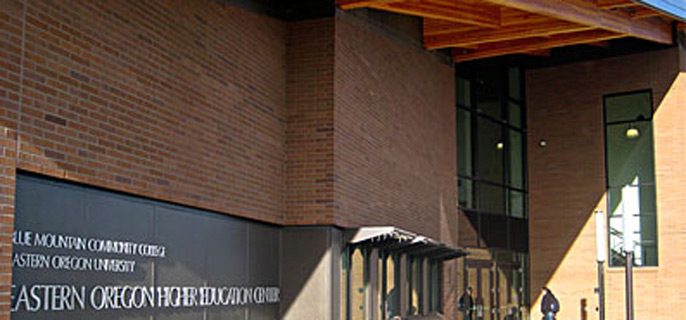
PHOTO COURTESY OF EOU
Initial courses offered at the Eastern Oregon Higher Education Center this fall aim to bring students and industry together.
Offered by Eastern Oregon University, course programming will seek to meet employment needs by plugging into the region’s dominant economic driver: agribusiness.
Laura Gow-Hogge, Ph.D., a consultant with EOU’s College of Business, conducted an in-depth assessment of the higher education and workforce needs in the Hermiston area. What emerged through many interviews and focus groups was a prevalent lack of specific curriculum and training to support a burgeoning industry.
“Trends in worldwide population growth indicate food production must double by the year 2050,” Gow-Hogge said, “so agribusiness is poised to explode.”
Taking an industry-focused approach, EOU’s new programming combines courses like international business and marketing with public policy and food safety, human resource and risk management as they relate to the local and global food supply chain.
“Employers want to hire individuals who already know these things and can hit the ground running,” Gow-Hogge said.
Because internships and hands-on learning are critical components, the university is reaching out to area employers to work with program faculty to help shape the curriculum. In the pilot phase, two credit courses will be available in a flexible format combining online, onsite and live delivery at the Higher Education Center.
Steve Clements, associate dean of business at EOU, said breaking from the traditional five-credit model of other business courses will increase accessibility for students who are already working in agribusiness and seeking additional training.
“This is another opportunity to be more innovative with the structure and delivery of our courses,” Clements said.
EOU will also be utilizing technology to help increase access to its courses. Synchronous courses using video conferencing are available at the university’s centers across the state, with other programs offered face-to-face or through a mix of face-to-face and online instruction.
“Providing educational options that are both accessible and affordable is a big part of our commitment to serving the needs of the region,” Clements added.
Clements also said EOU is hoping to augment programs offered by Blue Mountain Community College and Columbia Basin College, and create a “seamless transition” for students seeking to transfer to a four-year school. Further collaboration may include Oregon State University’s Agriculture Research and Extension Center.
Jacelyn Keys has been working at the Higher Education Center since it opened in September 2011. As EOU’s local advisor, Keys is currently assisting 250 students; 146 are from Hermiston, Irrigon, Heppner, Stanfield, Echo and Umatilla.
While business is of predominant interest, EOU offers 380 possible liberal studies degree combinations in addition to multiple majors and minors available completely online, ranging from history to psychology.
EOU’s MBA program is also offered through hybrid delivery at the center, similar to other locations in Prineville, Eugene and Ontario.
For more information on the agribusiness courses and other EOU programs in Hermiston, contact Keys at 541-289-2840 or visit the EOU website. A list of the university’s regional center locations throughout the state is also available online.










